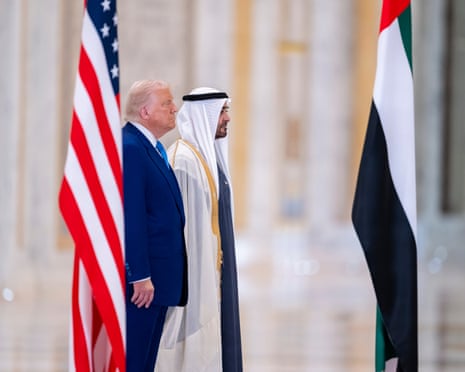Trump Administration Signs Landmark AI Deal with UAE
The United States and the United Arab Emirates have finalized an agreement for the Gulf state to construct the largest artificial intelligence campus outside the US. This development comes as part of several deals related to AI made during Donald Trump’s recent visit to the Middle East.
The agreement has raised concerns among some officials, as it could potentially give the UAE access to advanced AI chips that were previously restricted due to fears of Chinese influence. Under the terms of the deal, the UAE could import up to 500,000 of Nvidia’s most advanced AI chips annually starting in 2025, according to sources cited by Reuters.

The deal represents a significant win for the UAE, which has been attempting to balance its relationships with both the US and China. The Gulf state has been investing heavily in its AI capabilities, spending billions of dollars to become a global player in the field. However, under the previous Biden administration, the UAE faced restrictions on accessing US chips.
The agreement includes commitments from the UAE to invest in US datacenters that are at least as large and powerful as those being built in the UAE. The White House stated that the deal contains “historic commitments” by the UAE to align their national security regulations with those of the United States, including strong protections to prevent the diversion of US-origin technology.
The AI campus in Abu Dhabi will span 10 square miles and have a 5GW power capacity for AI datacenters. The project will be developed by Abu Dhabi’s state-backed firm G42, with American companies operating the datacenters and offering US-managed cloud services throughout the region.
This development is seen as a major turnaround in US policy, with the Trump administration expressing confidence that the chips can be managed securely. Some experts worry that such deals with Persian Gulf countries could further erode the US’s grip on emerging AI technology and potentially allow China to access these datacenters.
Major CEOs from AI and chip companies, including OpenAI’s Sam Altman and Nvidia’s Jensen Huang, appear to support the deal, as it could expand their products’ reach to a broader global market and potentially yield significant profits.
The agreement reflects the UAE’s efforts to recalibrate its tech strategy to align with US standards and protocols, particularly in compute, cloud, and chip supply chains. While this doesn’t mean abandoning China entirely, it signifies a shift towards deeper technology partnerships with the US.


